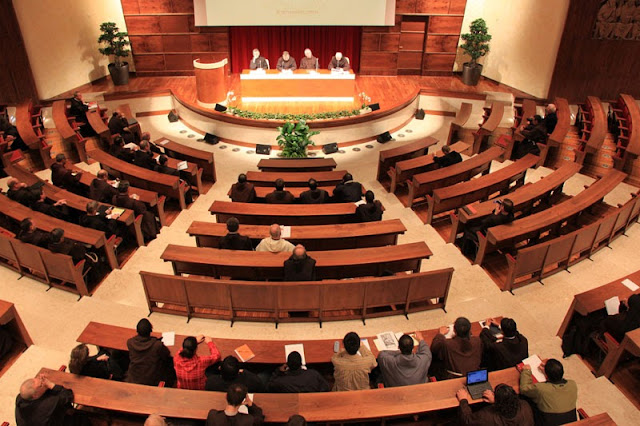Address to the Franciscan Scotus Commission
ADDRESS OF JOHN PAUL II TO THE MEMBERS OF THE SCOTUS COMMISSION
Saturday 16 February 2002
To the Most Reverend Father Giacomo Bini Minister General of the Order of Friars Minor
1. First of all, I am pleased to greet you, Father Giacomo Bini, the members of the Scotus Commission and all who are involved in the General Secretariate for Formation and Studies. I affectionately greet the entire Order of the Friars Minor.
I am very grateful for the gift of volume VIII of the Opera Omnia of Bl. John Duns Scotus that contains the last part of Book II of the Ordinatio, the last and most important work of the Doctor subtilis.
Bl. John Duns Scotus is a well-known person in Catholic philosophy and theology, whom my Predecessor Pope Paul VI described in his Apostolic Letter Alma Parens, of 14 July 1966, as "the perfector" of St Bonaventure, "the most distinguished representative" of the Franciscan School.
On that occasion, Paul VI asserted that in Duns Scotus' writings "latent certe ferventque Sancti Francisci Asisinatis perfectionis pulcherrima forma et seraphici spiritus ardores" (the beautiful form of the perfection of St Francis of Assisi and the fervour of his seraphic spirit are certainly hidden and yet present); he added that from the theological treasures of his works can be taken precious ideas for "peaceful conversations" between the Catholic Church and the other Christian confessions (cf. AAS 58 [1966] 609-614).
2. The works of Duns Scotus, reprinted several times in previous centuries, needed a thorough revision to clear them of the many errors of the copyists and of the annotations added by his disciples. It was no longer possible to study Scotus using those editions. A serious critical edition, based on the manuscripts was needed. This was also necessary for the works of St Bonaventure and St Thomas.
The Minister General of the Order of Friars Minor and his Definitorium entrusted the work to a special team of scholars, who were named the Scotus Commission and were established at the Pontifical Athenaeum Antonianum of Rome. To date they have published twelve volumes. With great dedication they have identified and indicated the direct and indirect sources that Scotus used in his writing. The footnotes contain all the useful and necessary information for a better understanding of the thought of this great Teacher of the Franciscan School.
Duns Scotus, with his splendid doctrine on the primacy of Christ, on the Immaculate Conception, on the primary value of the Revelation and of the Magisterium of the Church, on the authority of the Pope, on the capability of human reason to make the great truths of faith accessible, at least in part, and to show their non-contradictory nature, is even today a pillar of Catholic theology, an original Teacher, full of ideas and incentives for an ever more complete knowledge of the truth of the faith.
3. Dear members of the Scotus Commission, I am delighted to encourage your work since, as the Ratio Studiorum Ordinis Fratrum Minorum says: "the research centres of the Order, such as the Scotus Commission, through their scientific and editorial activity, carry out a service of primary importance regarding the conservation and transmission of the Order's historical, philosophical, theological and spiritual patrimony" (124). I am happy to take this opportunity to encourage the young friars to undertake studies so as to continue teaching and research at the Order's research centres.
I express the wish that in 2004, the year of the 150th anniversary of the Dogma of the Immaculate Conception of the Blessed Virgin Mary, the Scotus Commission may publish the 20th volume which will contain Book III of the Lectura, still unpublished, in which for the first time Duns Scotus defended the Marian privilege and earned himself the title of "Doctor of Mary Immaculate".
I entrust to the Queen of the Franciscan Order the work of the Commission, while to you, Father Minister General, to all who are present with you and to all those who make your activity possible, I impart my heartfelt Blessing.





Comments
Post a Comment